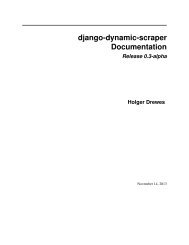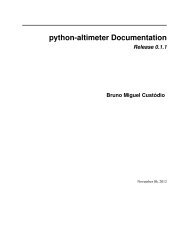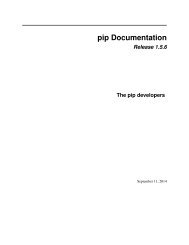py Documentation - Read the Docs
py Documentation - Read the Docs
py Documentation - Read the Docs
Create successful ePaper yourself
Turn your PDF publications into a flip-book with our unique Google optimized e-Paper software.
<strong>py</strong> <strong>Documentation</strong>, Release 1.4.27.dev1<br />
insert()<br />
L.insert(index, object) – insert object before index<br />
pop([index]) → item – remove and return item at index (default last).<br />
Raises IndexError if list is empty or index is out of range.<br />
remove()<br />
L.remove(value) – remove first occurrence of value. Raises ValueError if <strong>the</strong> value is not present.<br />
reverse()<br />
L.reverse() – reverse IN PLACE<br />
sort()<br />
L.sort(cmp=None, key=None, reverse=False) – stable sort IN PLACE; cmp(x, y) -> -1, 0, 1<br />
3.2.4 <strong>py</strong>.code.Frame<br />
Frame wrappers are used in <strong>py</strong>.code.Traceback items, and will usually not directly be instantiated. They provide<br />
some nice methods to evaluate code ‘inside’ <strong>the</strong> frame (using <strong>the</strong> frame’s local variables), get to <strong>the</strong> underlying code<br />
(frames have a code attribute that points to a <strong>py</strong>.code.Code object) and examine <strong>the</strong> arguments.<br />
Example (using <strong>the</strong> ‘first’ TracebackItem instance created above):<br />
>>> frame = first.frame<br />
>>> isinstance(frame.code, <strong>py</strong>.code.Code)<br />
True<br />
>>> isinstance(frame.eval(’self’), <strong>py</strong>.path.local)<br />
True<br />
>>> [namevalue[0] for namevalue in frame.getargs()]<br />
[’cls’, ’path’]<br />
class <strong>py</strong>.code.Frame(frame)<br />
Wrapper around a Python frame holding f_locals and f_globals in which expressions can be evaluated.<br />
statement<br />
statement this frame is at<br />
eval(code, **vars)<br />
evaluate ‘code’ in <strong>the</strong> frame<br />
‘vars’ are optional additional local variables<br />
returns <strong>the</strong> result of <strong>the</strong> evaluation<br />
exec_(code, **vars)<br />
exec ‘code’ in <strong>the</strong> frame<br />
‘vars’ are optiona; additional local variables<br />
repr(object)<br />
return a ‘safe’ (non-recursive, one-line) string repr for ‘object’<br />
getargs(var=False)<br />
return a list of tuples (name, value) for all arguments<br />
if ‘var’ is set True also include <strong>the</strong> variable and keyword arguments when present<br />
22 Chapter 3. <strong>py</strong>.code: higher level <strong>py</strong>thon code and introspection objects

















